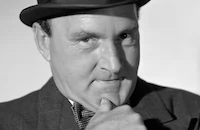Hysteria

Brief Synopsis
Cast & Crew
Freddie Francis
Robert Webber
Anthony Newlands
Jennifer Jayne
Maurice Denham
Lelia Goldoni
Film Details
Technical Specs

Synopsis
Following an automobile accident, American Chris Smith finds himself in a London hospital. Chris is informed by Dr. Keller, the physician treating him for amnesia, that his bills are being paid by an anonymous benefactor, who has made an apartment available to him. Upon release from the hospital, Chris seeks the help of Hemmings, a private investigator, and moves into the flat. To learn more about a torn photo that is his only link with the past, Chris visits the photographer, who tells him that the subject is dead, the victim of a shower murder. Warned by Dr. Keller to anticipate hallucinations, Chris hears strange voices in his flat and encounters Denise, who claims to be the widow of the man responsible for the automobile accident but bears a remarkable resemblance to the woman in the photograph. Denise plies Chris with drugs, and after one such episode, he discovers in his shower the body of a murdered woman, which later disappears. Assisted by Hemmings, Chris tricks Denise and Keller into admitting that they are the murderers, having planned to frame him for the crime, and that the victim is the physician's wife. Chris continues the romance begun in the hospital with his nurse, Gina.

Director

Freddie Francis
Cast

Robert Webber
Anthony Newlands
Jennifer Jayne

Maurice Denham
Lelia Goldoni
Peter Woodthorpe
Sandra Boize

Sue Lloyd
John Arnatt

Marianne Stone
Irene Richmond
Kiwi Kingston
Crew
Yvonne Axworthy
Don Banks
Edward Carrick
Chambers & Partners
Maude Churchill
Alex Garfath
David Harcourt
Alice Holmes
Roy Hyde
Philip Martell
James Needs
Basil Rayburn
Jimmy Sangster
Jimmy Sangster
Cyril Swern
Don Weeks
John Wilcox

Film Details
Technical Specs

Articles
Hysteria (1965)
As Hysteria opens, American Chris Smith (Robert Webber) wakes up in a London hospital following a devastating car crash. Now four months into his recovery, he suffers from amnesia and is being treated by Dr. Keller (Anthony Newlands) and his nurse Gina McConnell (Jennifer Jayne). Keller tells Smith that an anonymous benefactor has been paying for his medical treatment, and upon being discharged, Smith finds that he has a luxury apartment to stay in as well. The apartment building is otherwise empty, however, so the arguing voices that Smith hears through the wall may be specters, or perhaps the hallucinations that Dr. Keller warned him about. Smith has a torn photo of a model found on him at the crash site and investigates the girl. He also hires a private investigator named Hemmings (Maurice Denham) to discover the identities of his benefactor and the woman in the picture. Smith's own detective work leads to a London photographer, Marcus Allan (Peter Woodthorpe), who tells him that the model he seeks was murdered by stabbing - in a shower. At the apartment building Smith encounters the wealthy Denise (Lelia Goldoni), who claims to be his benefactor. She says that her late husband decreed that Smith be given anything he requires, although she does not know the reason. Smith's possible hallucinations continue as he sees a murder victim in a shower in the still-under-construction apartment next to his.
By 1965 the psycho drama genre was losing box-office steam; in America it had been well played-out by such offerings as Robert Aldrich's What Ever Happened to Baby Jane? (1962) and Hush... Hush, Sweet Charlotte (1964), and by William Castle's Homicidal (1961) and Strait-Jacket (1964). Hysteria received scant critical notice, at least in the U.S. Howard Thompson, writing in the New York Times said that Hysteria "...has been slung together with such bland lethargy that a fairly workable plot is all but snuffed out of focus." He calls the film "mediocre" but admits that the twists aren't entirely predictable, saying "it's easy enough to guess half of the whodunit denouement. Just try for the whole answer." Of the cast, Thomson writes that "[Robert Webber's] entanglement in a gory murder involves a sinuous brunette, a gentle-spoken doctor, a rather frayed detective and a spunky nurse. And by a small miracle Maurice Denham and Jennifer Jayne, as the last two, manage to be excellent. But it's not nearly enough to save Hysteria."
Director Freddie Francis continued to make horror films well into the 1970s, often for Hammer's chief rival, Amicus Productions. Here, Francis turned out several very entertaining anthology movies, such as Dr. Terror's House of Horrors (1965), Torture Garden (1967), and Tales from the Crypt (1972). Beginning in 1980 Francis returned to cinematography, first with The Elephant Man (1980), directed by David Lynch. He won his second Oscar® for cinematography for Glory (1989); his first had been for Sons and Lovers (1960) almost 30 years previous.
Producer: Jimmy Sangster
Director: Freddie Francis
Screenplay: Jimmy Sangster
Music: Don Banks
Cinematography: John Wilcox
Supervising Editor: James Needs
Production Design: Don Weeks
Cast: Robert Webber (Chris Smith), Anthony Newlands (Dr. Keller), Jennifer Jayne (Gina McConnell), Maurice Denham (Hemmings), Lelia Goldoni (Denise James), Peter Woodthorpe (Marcus Allan).
BW-85m.
by John M. Miller

Hysteria (1965)
Quotes
Trivia
Notes
Released in Great Britain in 1965.














